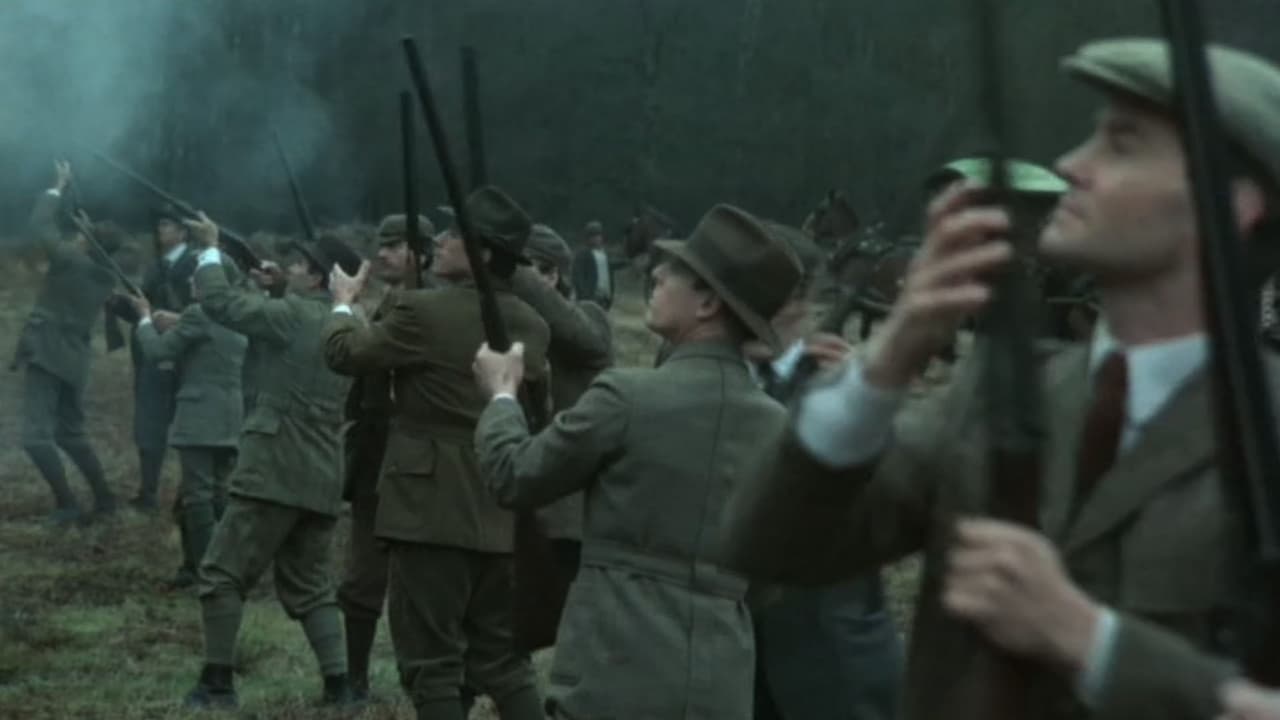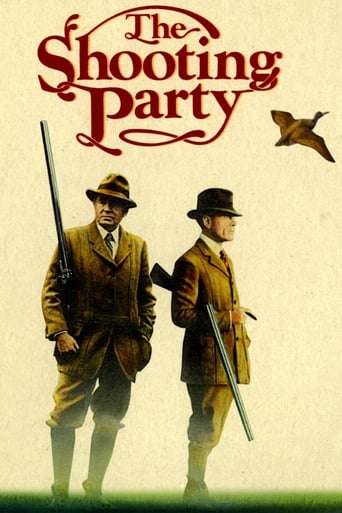



Disturbing yet enthralling
A Masterpiece!
I am only giving this movie a 1 for the great cast, though I can't imagine what any of them were thinking. This movie was horrible
View MoreI think this is a new genre that they're all sort of working their way through it and haven't got all the kinks worked out yet but it's a genre that works for me.
View MoreEnglish author Isabel Colgate wrote a 1980 novel by this same title that paints a picture of a segment of British society after the turn of the 20th century and before World War I. Critics and reviewers of the day talked and wrote about the conflicts "The Shooting Party" covered. The "sport" of overindulgent killing of game birds, versus the rights of animals. The self-absorption among the idle wealthy and the disdain for the lower classes. How many in the aristocracy considered their class above reproach for dalliances, adultery and such."The Shooting Party" shows life amid some of the class of lords, ladies and idle rich in 1913. Their lives indeed seem to have so little meaning. They seemed to live for mere pleasure or self-indulgence, in which they find so little pleasure. The genius in the making of this film is in the tedium the audience soon begins to feel by this lifestyle. The women and men gossip idly, the parties ride and trek to the fields to take up shooting positions with canes to sit on. The servants reload and hand shotguns to the wealthy. Two of the men compete for kills, and the pheasants fly and die by the droves. And, the lower classes beat the bushes to scare up the game and wait on the wealthy. The wealthy eat, imbibe and gossip at all times. Some carry on adulterous affairs at night. And they get up in the morning to do it all over again. A fine cast conveys the emptiness of such life. James Mason is Sir Randolph Nettleby, who appears to have no taste for these social affairs. So, when John Gielgud's Cornelius Cardew arrives as a protester for animal's rights, Sir Nettleby finds something finally of interest. Edward Fox plays Lord Gilbert Hartlip, as only Fox can portray a total snob who is completely detached from those around him - except for a spark of competition with another shooter. Even after shooting one of Sir Nettleby's gamekeepers by careless action, he is more concerned about the delay the accident causes than the man he has shot. All he can say after looking on the wounded man, whom Sir Randolph tends to, is "Pity." The man shot is gamekeeper Tom Harker, played by Gordon Jackson. Cheryl Campbell plays the adulterer Lady Aline Hartlip, Lord Gilbert's wife. Dorothy Tutin plays Sir Randolph's wife, Lady Minnie Nettleby. Rupert Frazer plays Lionel Stephens, and Judi Bowker plays Lady Olivia Lilburn. The film has many more fine cast members who do very well. The shooting accident puts a pale on the affair. As the credits run at the end, the film has a list of males who were part of the story, and who were killed within a few years in World War I. This adds further to a sense of the foibles of the self-centered culture and lifestyle of the period. The listed casualties of the war, from characters in the film, were: Captain Lionel Stephens MC, killed in action in 1915 at Ypres; Oberstleutnant Count Tibor Rakassyi, KIA in 1916 at Stobykhva; Lieutenant Marcus Nettleby, KIA in 1916 at Delville Wood, The Somme; Lance-Sergeant Walter Weir, dies of wounds in 1915 at Gallipoli; and Private John Haskins, KIA in 1917 at Passchendaele. This isn't an entertaining film, but one that some may appreciate who enjoy history.
View MoreIn the autumn of 1913, a group of guests assemble at Nettleby Hall, the country seat of Sir Randolph Nettleby, for a shooting party. (References to Dorking and Hindhead suggest the film is set in Surrey). Shooting was an upper-class obsession in the nineteenth and early twentieth centuries; the "Summer Season" of social gatherings always ended in early August to allow the aristocracy to travel to the Scottish moors for the start of the grouse season on the "Glorious Twelfth". Once that was over, they returned to their English estates in October for pheasant shooting. Winter was the season for wildfowling on the marshes.A more recent British film, "Gosford Park", also featured a shooting party at a stately home. In that film, the owner of the house, the parvenu businessman Sir William McCordle, is both deeply unpleasant and deeply unpopular; when he is murdered halfway through there is no shortage of suspects as he was hated by many of his family, his guests and his domestic staff. Sir Randolph, by contrast, is a gentleman of the old school, intelligent, thoughtful and decent, popular with both his fellow-aristocrats and with his servants and tenants. Although his position obliges him to host gatherings such as this one, he has mixed feelings about them. He feels that the upper classes take their pleasures too seriously, something he regards as a sign of a civilisation in decline. When the shoot is interrupted by Cardew, an elderly and eccentric animal lover, Randolph does not have him charged with trespass or manhandled off the estate by his servants (as many landowners would have done) but instead calmly debates with him.Among Sir Randolph's guests are another aristocrat, Lord Gilbert Hartlip, and Lionel Stephens, a young lawyer. Both are excellent shots and there is intense rivalry between them as they compete to see who can kill most birds. We also learn something of their private lives. Lord Gilbert is trapped in an unhappy marriage, and both he and his wife have taken lovers. She is a compulsive gambler; among the other guests is one of her lovers, the wealthy businessman Sir Reuben Hergesheimer, who has agreed to pay off her debts in exchange for sexual favours. Stephens is in love with Olivia, the beautiful young wife of the much older Lord Lilburn. Although she returns his love, the affair seems doomed, as the social conventions of the day frowned upon divorce. There is a tragic conclusion to the rivalry between Hartlip and Stephens; desperate to prove himself the better shot, Hartlip continues to fire recklessly after the order to stop has been given, and one of the beaters is hit.The film features a selection of some of Britain's best-known actors, including James Mason, John Gielgud, Edward Fox and Gordon Jackson. This was Mason's last role before his death, and one of his best. Towards the end of his career he played a number of world-weary aristocrats, reluctantly facing the decline of their once-secure world, such as Franz Josef in "Mayerling" and Klugemann in "The Blue Max", and Sir Randolph is another. There are too many good performances to mention them all, but I must single out Cheryl Campbell as Lady Hartlip, Fox as her husband and Judi Bowker as Olivia.The date of the film is, of course, significant. 1913 was to be the last shooting season before the ruling classes of Europe decided that killing humans took precedence over killing birds. Autumn is traditionally the season for pheasant shooting, but in this film there is an obvious symbolic significance to the time of year. The prevailing colours are dull ones- browns, greys, muted greens and yellows with few bright tones. This is an autumn of mists and overcast skies, not an autumn of brilliant colours like the one in "Far from Heaven". Autumn becomes a symbol of a society in decline. The slaughter of the birds is a symbol of the much greater slaughter which was to start the following year. This sense of decline and decadence pervades the film; even a sensitive and kindly man like Sir Randolph, who foresees the coming war with Germany, believes that war might be a good thing, a chance to rebuild a new society on the ruins of the old. Today, of course, we know that the war was to prove far bloodier than anyone had foreseen and that the new world which arose after it was in most respects worse than the old one, so talk like that sounds to our ears like dangerous nonsense. In 1913, however, it must have seemed dangerously seductive.The year is significant for another reason. 1913 was not only the year before the outbreak of World War One, it was also two years after the passing of the Parliament Act 1911 which had restricted the power of Britain's House of Lords to block Government legislation. The aristocracy retained their wealth and privilege, but their political power was starting to wane following the introduction of universal male suffrage and the growth of more populist politics. The film makes mention of David Lloyd George, the radical Chancellor of the Exchequer and a popular figure among the working classes for his opposition to aristocratic privilege. There was to be no Russian-style revolution in Britain, so the war did not see the end of the country house lifestyle; it continued throughout the twenties and thirties ("Gosford Park" is set in 1932) and, to some extent, still persists today. Nevertheless, the aristocracy have never again held the central role in society which was theirs before the twentieth century.The eighties were perhaps the decade most associated with the "heritage cinema" movement in Britain. Although it is visually much more restrained than, say, the work of Merchant Ivory, Alan Bridges' film is an excellent example of this tradition, a haunting and elegiac commentary on the inevitable processes of social change. 8/10
View MoreWhile the whole film is beautifully accomplished on all levels, acting, directing, sense of time and place, the scene between James Mason and John Gielgud, which takes place during a shoot, reveals acting that has gone beyond acting. It is one of the most exquisite scenes in the history of the cinema. Mason and Gielgud are perfect.
View MoreIf you like Merchant/Ivory films, then you will also enjoy this one. It moves slowly but surely as we witness the sun setting on the aristocracy and on the British Empire, set in the microcosm of an English country estate. These people are doomed, in various ways, but, more than that, a way of life that flourished for centuries is about to be extinguished by the slaughter of WWI. James Mason is the lord of the manor and plays the part as if he were born to it. This was his last film and it makes you realize how much he is missed. Edward Fox has a field day playing the weak, tradition bound guest who can't abide being bested and Cheryl Campbell is terrific as his wayward wife. There are many good supporting roles but Gordon Jackson, as one of the "beaters" is a stand-out; his final scenes are brilliantly done. Sir John Gielgud walks through as a protester against the hunt and sparkles in that small role. It is sometimes difficult to figure out who is related to whom since there are a lot of characters, all of whom have some interrelationship. This is a beautiful film, rich in scenary and it captures a time and life that died in the trenches of the Great War. Highly recommended.
View More